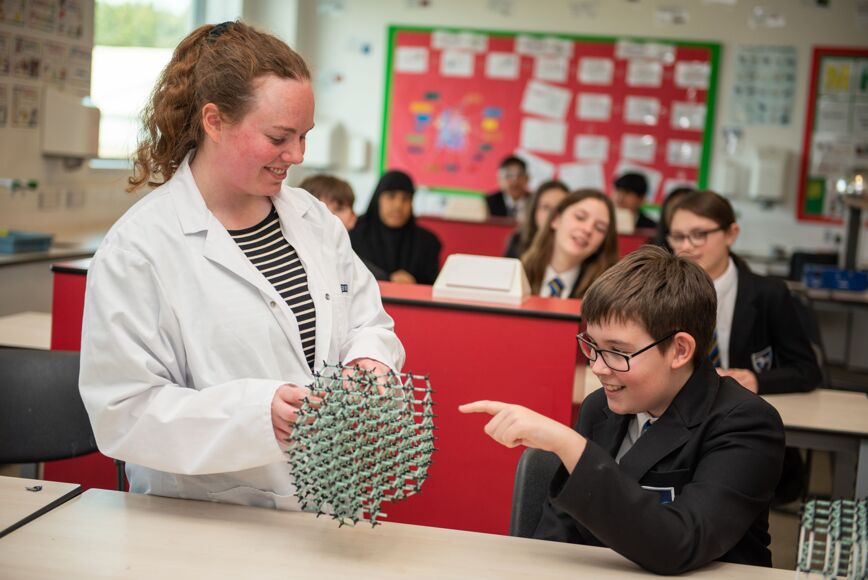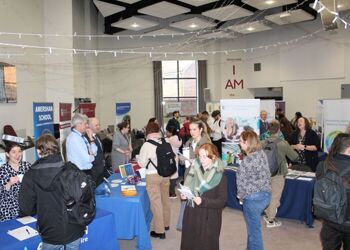 January 20th 2026
January 20th 2026- Home
- Apply
- Entry criteria
Entry criteria

Safeguarding is at the forefront of all our selection processes and decision-making.
When selecting applicants to call for interview, we are always looking for your potential to teach, and most definitely not the finished product!
Alongside your qualifications, we are interested in your application as a whole. We pay close attention to your personal statement. Your personal statement should be written by yourself and carefully checked. We strongly advise against the use of AI which tends to generate very generic statements which say little about the applicant. Where appropriate, such as those switching careers, we take into account previous experience, whether in education or another sector.
Teaching is a demanding profession so we are looking for those with those willing to learn and to develop the knowledge, understanding and skills required of teachers.
We are also interested in understanding your motivations for teaching and your awareness of the professional values that underpin teaching.
What we are looking for
Potential to teach
We are looking to recruit candidates who have the potential to become outstanding teachers. This will be demonstrated in a number of ways, including:
- Your specialist subject knowledge
- Your ability to communicate with enthusiasm about learning and about your subject/specialism
- Your ability to reflect on experiences of working with children and young people in schools or other settings
- Your knowledge of the school curriculum and current educational issues
- Your commitment to securing relevant experience and knowledge to support your application
Experience
Prior work experience in a school is not required, and lack of school experience is not a reason for rejecting an otherwise suitable applicant.
However, some experience of working with children, for example helping with a sports team, drama group, or youth club, is beneficial.
For Salaried places, relevant work experience is highly desirable.
Qualifications
Minimum degree
You must be a graduate with an honours degree, with a 1st, 2:1 or 2:2, though in exceptional circumstances we are willing to consider applicants who have a Third who can demonstrate a real aptitude for teaching, dependent on the phase or subject/specialism for which you are applying. Admission to the PGCE element of the course always requires at least a 2:2.
For secondary trainees, your degree must be in the subject that you intend to teach or a subject that is closely related. You must be able to demonstrate that you have sufficient subject knowledge to be able to teach across the 11-18 age range or the capacity to develop this knowledge in a short space of time. In a number of subjects, Subject Knowledge Enhancement courses may be available and some of these are funded - further information is in the section on these courses below.
We recommend that applicants for Modern Foriegn Languages are able to teach more than one language at Key Stage 3. For example, applicants for Spanish should have sufficient knowledge of another school language such as French to be able to teach this in Key Stage 3 (or be capable of gaining it).
For primary trainees, there is no requirement to hold a degree in a particular subject but the same academic requirements apply.
GCSEs
All candidates except apprentices must have at least grade 4/ C or equivalent in GCSE Maths, English (and for Primary, a Science subject). We accept a number of GCSE equivalencies, but do not accept IELTs, Functional Skills or similar qualifications on their own.
For those on the Apprenticeship route, you must have at least grade 4/ C or equivalent for GCSE Maths, English (and for Primary, a Science subject). GCSE equivalencies in English and Maths are only acceptable when accompanied by Level 2 Functional Skills qualifications.
A levels
3 A levels (or equivalent) at C or above would be desirable, but not essential for some subjects/specialisms. We accept BTEC qualifications.
For secondary trainees, one of your A levels or BTEC qualifications should be in the subject which you intend to teach or be in a closely related subject.
Higher degree
A higher degree would be desirable, but not essential.
Equivalent Qualifications
We welcome applicants with equivalent qualifications such as Scottish Highers or Standard Grades. We also recognise that graduates enter university via different routes and that some applicants will have alternative qualifications such as Access to Learning courses in place of A levels or BTECs.
Overseas Qualifications
Every year we accept a significant number of trainees with overseas qualifications. Further information on entry criteria for overseas educated applicants is here. You need to be able to demonstrate that your degree is of an equivalent standard to a UK degree both in terms of depth and scope of study and we will require to see transcripts, with translations if necessary, of any overseas qualifications.
All candidates must be able to demonstrate that they meet the fundamental proficiencies in English and maths and you must have GCSE Maths and English/ English Language (or equivalent). IELTS scores should be an average of 6.5 or higher.
Personal and professional aptitudes and skills
Essential requirements:
- Fundamental English and maths skills
- Skills, knowledge and attributes demonstrating suitability to train to teach across the full age and ability range: 5-11, 11-18 (or 14-18 in Business Studies and Economics)
- Ambitious to teach at a good or outstanding level at the end of the training year
- Highly motivated and enthusiastic
- High professional standards
- Understanding of the need to safeguard students
- Understanding of the requirement to uphold public trust in the profession
- Tolerance and respect for others' actions/beliefs; upholding fundamental British values eg mutual respect, democracy
- Aware of need for high expectations of students in terms of behaviour and achievement
- Ability to work effectively and flexibly as a member of a team
- High quality organisational skills
- Ability to motivate students
- Ability to self reflect and set appropriate targets
- Willingness to engage in development activities
- Willingness to play a part in the wider life of a school
- Good personal communication skills
Desirable requirements:
- Potential to write at Masters level
Shortlisting and Interviews
The Astra SCITT operates recruitment hubs for primary and secondary recruitment across its network of over 60 schools:
1. Astra Amersham & Marlow Hub - Amersham and surrounding areas, including Marlow and Maidenhead.
2. Astra Aylesbury Hub - Aylesbury and surrounding area.
You should submit your application via DfE Apply to your preferred Hub. The Hub will then coordinate the recruitment process.
If your application is shortlisted, you will be asked to undertake a short telephone or Google Meet interview to undertake initial checks on your application. You will also be invited to an interview at one of our schools or, in some cases, at the Astra offices. The application and interview process for each hub is identical and is quality assured by the leadership team at the Astra SCITT.
A typical interview day will have the following format:
- Written tests (of approximately one hour).
- A teaching activity, such as teaching a lesson (you will be informed in advance about the content and age group) to the interview panel or to a class of pupils.
- Primary candidates will read a story to a group of children.
- A discussion on the lesson you have taught.
- A panel interview.
- A tour of the school.
If you are successful at the interview, you will receive a conditional offer of a place. The conditions will include providing proof that you have met the eligibility conditions for Initial Teacher Training, which includes a criminal record check (DBS) and an occupational health assessment. Other conditions, such as additional subject knowledge enhancement, may also be discussed with you at the interview.
Please note that applicants for salaried positions will normally be asked to teach a full one hour lesson and/or complete other tasks that the employing school may specify.
Fundamental Maths and English skills
As providers we are required to ensure that our trainees have the fundamental maths and English skills needed to gain QTS.
We therefore carry out diagnostic assessments for these skills prior to you starting the course. These assessments particularly look at your technical accuracy (spelling, punctuation and grammar) in English and your ability to apply maths in practical situations. As a teacher you will be writing regularly and using mathematics, regardless of your subject or phase.
Where trainees might have a development need in either or both areas, you will be expected to work during your course to close this gap.
Details of these fundamental proficiencies can be found here.
Subject Knowledge Enhancement (SKE) courses
Subject Knowledge Enhancement (SKE) courses are designed to enable trainee tecahers to develop the level of specialist knowledge required to teach their chosen subject.
These courses are for candidates whose degree included an element of the subject they intend to teach or who have extensive experience in the subject, but a degree in a different subject, as well as for candidates who may have completed their degree over five years' ago.
Examples of when a trainee might benefit from an SKE include:
- A French teacher whose degree is primarily in French but could also offer Spanish as a second language in Key Stage 3
- An engineering graduate, hoping to teach maths, whose degree contained a significant amount of maths but has not covered all of the current school curriculum
- A law graduate with A level English Literature, training to teach English, and who needs to enhance their knowledge of literature currently taught in schools
The above list is by no means exhaustive.
Taught online, trainees can begin at any point and are supported by a specialist tutor.
SKEs vary in length from six weeks to a full year and are supported by a small grant during the studying process. SKEs must always be completed prior to the start of a trainee's QTS course.
If this may be of interest, you should apply for a place to train as a teacher first, because having the offer of a training place is a prerequisite for being funded on a SKE course.
Each year, the Department for Education announces scholarship funding for SKEs in different subjects. For entry in 2025, these are Chemistry, Computer Science, Maths and Physics.
In some cases, especially when no Department for Education funding is available, we may still make completing a bespoke Subject Kniowledge Enhancement course a condition of acceptance on to the course. In such circumstances, we'll put together a programme of learning for you to complete. Typical tasks include reading and refreshing your subject knowledge and working with one our partner schools to develop your subject knowledge so that it is up to date.
Diversity, equity and inclusion
As an equal opportunities provider, we are committed to diversity and inclusion amongst our staff and trainees and treating everyone equitably.
Further details about Astra's commitment to diversity, equity and inclusion is here.
Visas
To apply for an Astra training programme, you must have the right to live and work in the United Kingdom for the duration of your course.
In common with most other SCITTs, we are unable to sponsor visa applications.



